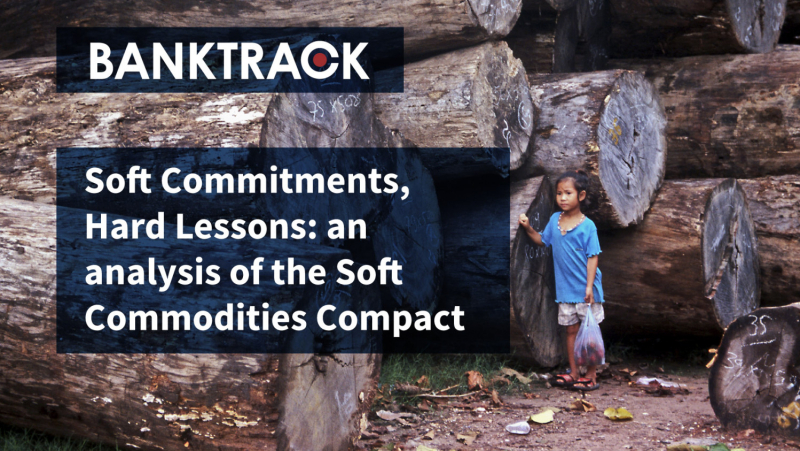Six years of the Soft Commodities Compact failed to slow bank finance for deforestation
nature@banktrack.org

nature@banktrack.org
The Soft Commodities Compact (SCC), an initiative signed by 12 banks which concludes at the end of 2020, has been unable to show any progress towards its target of supporting ‘zero net deforestation’ in the palm oil, soy, cattle, and pulp & paper and timber sectors. (1) This failure shows the urgent need for the banking sector to develop a fresh approach to the crisis facing the world’s forests, concludes a BankTrack report titled “Soft commitments, Hard lessons” released today.
The 12 banks committed under the SCC to support their clients in soft commodity supply chains to reduce deforestation through an approach largely focused on requiring clients to sign up to certification schemes. (2) However, a month from the end of the Compact, none of the banks succeeded in ensuring all their clients were certified by 2020.
Six banks have not even reported on the proportion of their clients that have achieved certification, one month before the Compact ends. These banks are BNP Paribas, Lloyds Banking Group, Rabobank, Société Générale, UBS and Westpac.
Figures extracted from the Forests and Finance website (forestsandfinance.org) show that banks that adopted the Compact have considerably increased their financial exposure to forest-risk companies since 2014. The global rate of forest loss has continued to increase throughout the Compact’s lifetime. (3)
Marília Monteiro, coordinator of BankTrack’s Forest Campaign and author of the report, comments: “We can see this initiative as a positive step from a dozen banks to align their finance more with sustainable practices. However, the failures of the Soft Commodities Compact started at its inception. If banks are serious about tackling the deforestation footprint of their clients’ supply chains in these important commodities industries, we need more ambitious action from a wider group of banks.”
Banks that signed the Soft Commodities Compact remain exposed to deforestation risks from providing financial support to giant commodities companies engaged in destructive practices, including JBS, Cargill and Asia Pulp and Paper (APP).
Based on its analysis, BankTrack recommends in the report that banks move beyond an approach focused on certification, and instead require clients to adopt “No Deforestation, No Peat, No Exploitation” (NDPE) frameworks backed with robust due diligence, traceability and transparency, within an ambitious timeframe which reflects the urgency of the linked crises of deforestation and climate change.
Download the full report here.
Notes for editors:
(1) The 12 banks that adopted the SCC are Barclays, BNP Paribas, Deutsche Bank, Lloyds Banking Group, JPMorgan Chase, NatWest, Santander, Société Générale, Standard Chartered, Rabobank, UBS, and Westpac. The website of the Soft Commodities Compact itself can be found here.
(2) Certification schemes considered as a “starting point” for each commodity under the SCC are: Roundtable on Sustainable Palm Oil (RSPO) certification for palm oil; Forest Stewardship Council (FSC) verification or that of a national scheme endorsed against the 2010 Programme for the Endorsement of Forest Certification (PEFC) meta standard for timber products; and Round Table on Responsible Soy (RTRS) certification for soy.
(3) The global rate of gross tree cover loss has increased by 43% in the last five years, according to a recent progress report from the New York Declaration on Forests.
